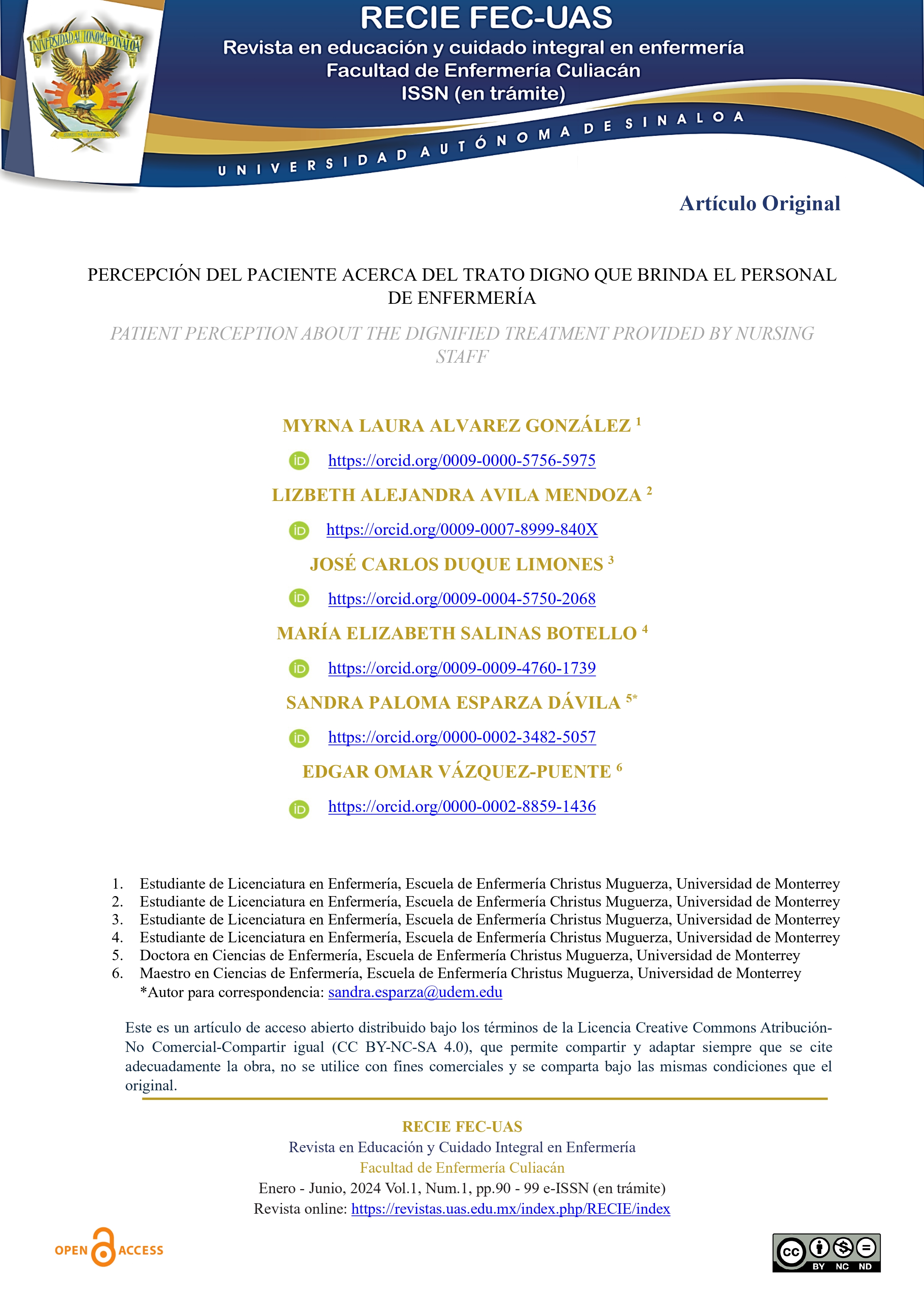Patient perception about the dignified treatment provided by nursing staff
Keywords:
Trato digno, percepción, paciente, enfermería, relaciones humanasAbstract
Introduction: In the nursing profession, quality and dignified treatment are essential to maintain the interest in improving the quality and effectiveness in the delivery of health services to the population, healthy or sick, to achieve the satisfaction of patients and families, to guarantee that they receive appropriate treatment, avoid errors and promote a safe and trusting environment through healthcare, teaching and research activities. Objective: to identify patients' perceptions of the human interactions provided by nursing staff and to describe their perception of the communication offered by nursing personnel. Methods: This quantitative, descriptive study involved 30 hospitalized patients in the emergency and inpatient departments. Participants were assessed using the Factorial Validity questionnaire on dignified treatment in nursing. Results: Among the participants, 60% were women. A significant majority, 96.6% of the patients, reported experiencing good dignified treatment. Specific areas for improvement identified included being addressed by name, feeling satisfied with the care received, and being educated about necessary self-care practices. Conclusions: Nursing plays a pivotal role in enhancing patients' experiences during their hospital stays, ensuring they feel respected and valued, and contributing to their overall well-being and recovery.
Downloads
References
Brito-Ortíz, J. F., Juárez-García A. J., Nava-Gómez, M. E., Castillo-Pérez, J. J., & Brito-Nava, E. (2019). Validez factorial del cuestionario sobre trato digno en enfermería. Rev Enferm IMSS 2019, 27(2), 97-104.
Campillo, B., Corbella, J., Gelpi, V. M., Martínez, E., Viciana, M. A., Montiel, J., Abos, E., Callejón, S., & Alonso, M. (2020). Percepción del respeto y mantenimiento de la dignidad en pacientes hospitalizados. Bioethica. Scielo, 26(1), 1726-569. https://dx.doi.org/10.4067/S1726-569X2020000100061
Campiño-Valderrama, S. M., Duque, P. A., & Cardoso, V. H. (2019). Percepción del paciente hospitalizado sobre el cuidado brindado por Enfermería. Universidad y salud Scielo, 21(3), 215-225. http://dx.doi.org/10.22267/rus.192103.158.
Culqui-Maldonado, P., Rojas-Ramírez, Y. M., & Fanning-Balarezo, M. M. (2020). Percepción del familiar usuario, respecto al trato que brinda la enfermera del servicio de emergencia. Ser, saber y hacer de enfermería, 2(1), 1-15.
Díaz-Oviedo, A., Martínez-Licona, F., & Hernández-Terrazas, L. E. (2020). Intervención socioeducativa para la práctica de enfermería: uso del indicador Trato digno. Sanus 5(15) 1-11. https://doi.org/10.36789/sanus.vi15.184.
Dois-Castellón, A., Bravo-Valenzuela., P., & Martínez-Pereira, A. (2022). El buen trato en el encuentro clínico de enfermería: características y atributos. Scielo, 31(4), 250-254. https://dx.doi.org/10.58807/indexenferm20225169.
Lugo-Galán, G., Alzua-Ramírez, V. H., & Fabian-Lagunas, A. (2023). Percepción del usuario del indicador de calidad proporcionado por el personal de enfermería: User perception of the quality indicator dignified treatment provided by nursing staff. Revista electrónica sobre cuerpos académicos y grupos de investigación, 10(20), 2448-6280.
Monge-Vera, P., Miranda, C. P., Oyarzun, J., Seguel, F., & Flores, E. (2018). PERCEPCION DE CUIDADO HUMANIZADO DE ENFERMERIA DESDE LA PERSCPECTIVA DE USUARIOS HOSPITALIZADOS. Ciencia y enfermería, 24,5. Epub 25 de septiembre. http://dx.doy.org/10.4067/s0717-95532018000100205.
Melita-Rodríguez, A., Jara-Concha, P., & Moreno-Monsiváis, M. G. (2021). Percepción de pacientes hospitalizados en unidades medico quirúrgicas sobre el cuidado de enfermería. Enfermería: Cuidados Humanizados, 10(1), 89-105. Epub 01 de junio de 2021. https://doi.org/10.22235/ech.v10i1.2481.
Santiago, R. (2020). Trato digno del paciente hospitalizado en una Institución de tercer nivel. Univerciencia, 17(50), 33-55.
Secretaría de Gobernación (SEGOB) (2014). Reglamento de la ley general de salud en materia de investigación para la salud. Diario Oficial de la Federación (DOF). México. Available in: http://www.diputados.gob.mx/Ley esBiblio/regley/Reg_LGS_MIS.pdf
Secretaria de Salud. (1987). Reglamento de la Ley General de Salud en Materia de Investigación para la Salud [Regulation of the General Law of Health in the Matter of Research for Health]. México. http://www.salud.gob.mx/unidades/cdi/nom/compi/rlgsmpsam.html
Yaguana-Saltos, L. K., Morocho-Minga, J. M., Sotomayor-Preciado,A. M. (2024). Percepción en trato digno y humanizado en el área de procedimientos del C.S. “Velazco Ibarra”. Polo Conocimiento, 9(1). 1341-1361. Doi: 10.23857/pe.v9i1.

Downloads
Published
Issue
Section
License
Copyright (c) 2024 RECIE FEC-UAS Revista de educación y cuidado integral en enfermería Facultad Enfermería Culiacán

This work is licensed under a Creative Commons Attribution-NoDerivatives 4.0 International License.

